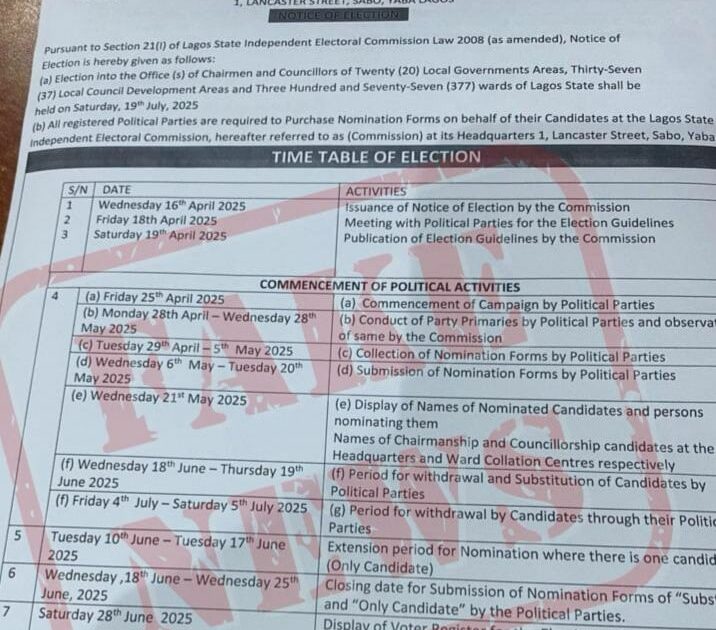The Lagos State Independent Electoral Commission (LASIEC) has issued a public statement denouncing a fraudulent notice regarding the 2025 local government elections that has been widely disseminated across social media and online platforms. The commission, through its Chairman, Justice Bola Okikiolu-Ighile (retd), categorically stated that the circulating notice did not originate from LASIEC and urged the public, especially political parties and stakeholders, to disregard it completely. This proactive measure aims to prevent misinformation and ensure that the public relies solely on official communication from the commission regarding electoral processes. The dissemination of false information regarding elections can create confusion and potentially disrupt the democratic process, hence the commission’s swift action to address the issue.
LASIEC emphasized its commitment to conducting elections according to established legal procedures. The commission reiterated that the process of organizing local government elections in Lagos State is meticulously governed by law. This includes the timely and official publication of election notices in various newspapers. The commission assured the public that when the time is appropriate, as prescribed by law, the authentic notice of the 2025 local government elections will be disseminated through official channels. This commitment to transparency and adherence to legal processes underscores LASIEC’s dedication to ensuring free, fair, and credible elections.
The fake notice incident highlights the increasing prevalence of misinformation in the digital age, particularly concerning crucial democratic processes like elections. The ease with which false information can be created and disseminated online poses a significant challenge to electoral integrity. LASIEC’s proactive response underscores the importance of vigilance and the need for citizens to rely on verified sources of information, especially when it comes to electoral matters. The commission’s clear and unequivocal statement aims to counteract the spread of misinformation and maintain public trust in the electoral process.
The incident also underscores the role of media literacy in navigating the digital information landscape. Citizens must be equipped with the skills and discernment to identify and differentiate between credible and unreliable sources of information. The ability to critically evaluate online content is crucial to prevent the spread of misinformation and ensure informed participation in democratic processes. LASIEC’s warning serves as a reminder of the importance of verifying information before sharing it, especially information related to critical public matters like elections.
LASIEC’s commitment to transparency and adherence to the rule of law is further emphasized by its proactive communication with the public. By promptly addressing the fake notice, the commission demonstrates its commitment to keeping the public informed and engaged in the electoral process. This open communication fosters trust and ensures that stakeholders are not misled by false information. The incident serves as a case study in how electoral bodies can effectively manage misinformation and maintain public confidence in the electoral system.
In conclusion, LASIEC’s swift response to the circulating fake notice reflects the commission’s commitment to conducting elections in a transparent and legally compliant manner. By proactively addressing the issue and reiterating its commitment to due process, LASIEC aims to ensure the integrity of the electoral process and maintain public trust. This incident also highlights the increasing challenge of misinformation in the digital age and the importance of media literacy in fostering informed civic participation. The commission’s actions serve as a model for other electoral bodies in proactively addressing misinformation and safeguarding the integrity of democratic processes.


